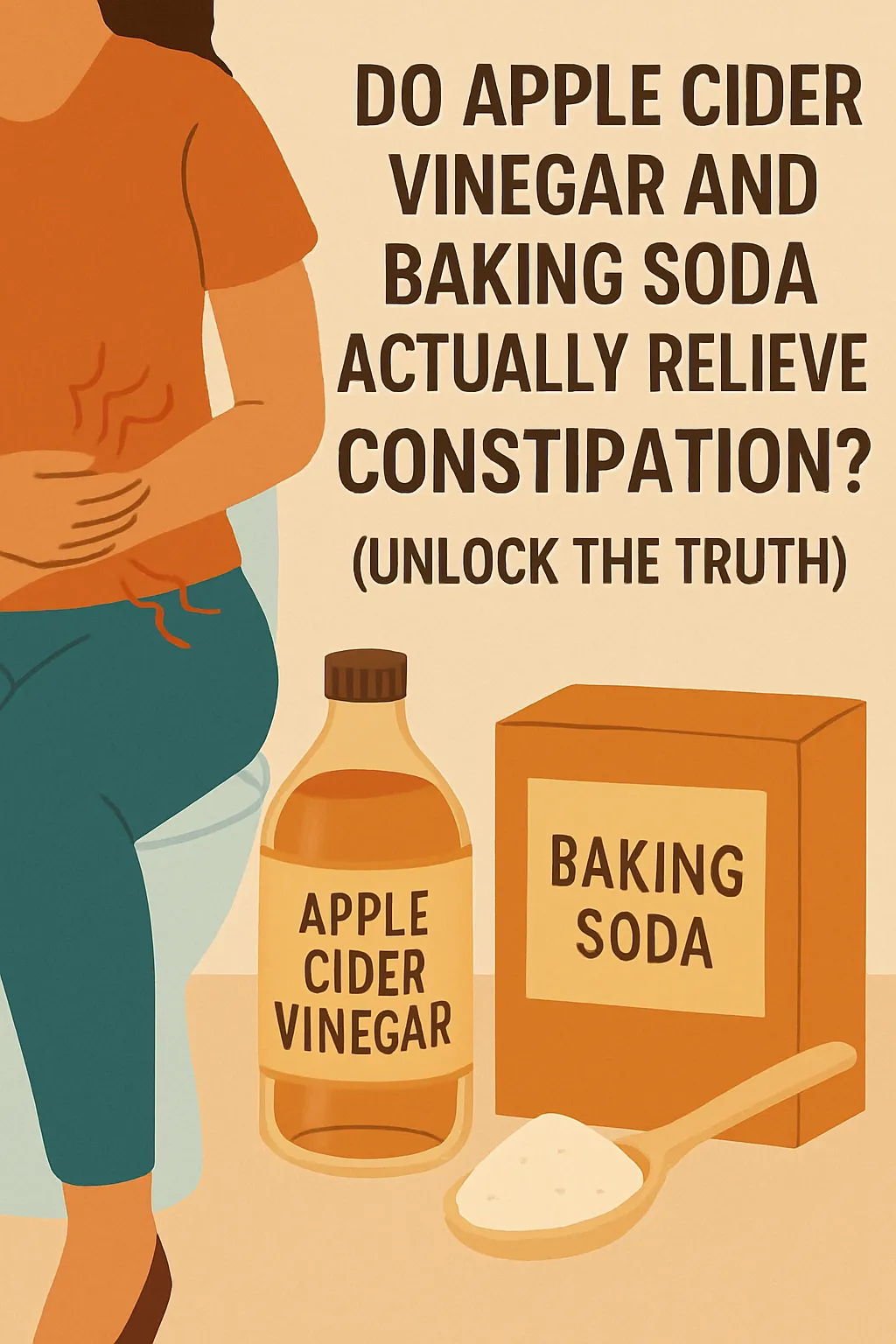Are apple cider vinegar and baking soda effective remedies for constipation? This guide explains their properties, potential benefits, risks, and safer alternatives for relief.

Dealing with constipation can be frustrating. Many people seek natural remedies for quick relief. Two common household items often recommended are apple cider vinegar (ACV) and baking soda. But do these actually help? Or are they just myths?
This guide explains what you need to know about using ACV and baking soda for constipation. You will learn about their properties, scientific facts, and safe methods to try them.
Understanding Constipation: Causes and Common Remedies
Constipation means having fewer than three bowel movements each week and feeling discomfort during elimination. Common causes include:
- Low fiber diet — not enough fruits, vegetables, or whole grains
- Dehydration — not drinking enough fluids
- Lack of exercise — sedentary lifestyles slow digestion
- Medications — opioids and some antacids can cause constipation
Traditional remedies focus on eating more fiber, drinking plenty of water, and staying active. Some people also try natural options like ACV and baking soda for relief.
Apple Cider Vinegar: A Natural Remedy?
What Is Apple Cider Vinegar?
Apple cider vinegar is made by fermenting crushed apples. It contains acetic acid, vitamins, minerals, and beneficial bacteria called “the mother.” ACV is used for digestion and weight loss. But proof for its role in relieving constipation is limited.
How ACV Might Help Digestion
Supporters say ACV may:
- Stimulate digestive enzymes — helping break down food
- Increase stomach acid — improving digestion
- Support gut bacteria balance — maintaining a healthy microbiome
However, scientific research does not prove that ACV relieves constipation. Healthline reports that there’s no strong evidence supporting ACV as a treatment for constipation.
Scientific Evidence
Current studies show no proven benefit for ACV in relieving constipation. Some people feel it helps when diluted in water, but research has not confirmed its effectiveness.
Baking Soda: An Alkaline Approach
What Is Baking Soda?
Baking soda, or sodium bicarbonate, is a white powder used in baking and cleaning. It helps dough rise and neutralizes acids.
How Baking Soda May Affect Digestion
Some believe baking soda could:
- Neutralize stomach acid — easing discomfort
- Draw water into the intestines — softening stools for easier bowel movements
But these are mostly anecdotal claims. Scientific proof for baking soda as a constipation remedy is lacking.
Research and Risks
There are no clinical trials confirming baking soda’s benefits for constipation. Experts warn against regular use due to risks like:
- Electrolyte imbalances
- Metabolic alkalosis — a serious increase in blood pH
Healthline cautions against mixing baking soda with ACV because the resulting gas can cause bloating or discomfort.
Combining ACV and Baking Soda
What Happens When You Mix Them?
Mixing ACV (an acid) with baking soda (a base) causes a reaction that produces carbon dioxide gas. This creates fizzing and bubbling.
Claimed Benefits
Some say this combination:
- Balances body pH — though the body regulates pH naturally
- Acts as a gentle laxative — by releasing gas into the stomach
But there is no scientific evidence supporting these claims.
Potential Risks
Mixing these substances may cause:
- Bloating and gas
- Electrolyte problems
- Interactions with medications
Experts recommend avoiding this mixture unless your healthcare provider advises otherwise.
Safer Alternatives for Constipation
Increase Dietary Fiber
Eating high-fiber foods promotes regular bowel movements. Examples include:
- Fruits: Apples, berries, pears
- Vegetables: Broccoli, carrots, leafy greens
- Whole grains: Oats, brown rice, whole wheat bread
Stay Hydrated
Drink plenty of water every day. Proper hydration softens stools and supports digestion.
Exercise Regularly
Physical activity stimulates bowel movements. Simple activities like walking can help.
Final Recommendations
- Use caution with ACV and baking soda. They are not proven remedies for constipation.
- Focus on fiber and hydration for natural relief.
- Consult your healthcare provider before trying new remedies, especially if you have health conditions or take medications.
Remember: Natural remedies should complement, not replace, medical treatment when needed.